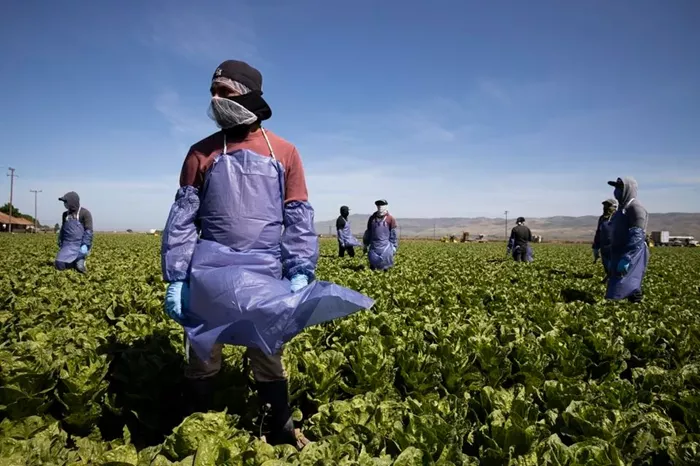Lawsuit Aims to Halt Labor Department Rule Affecting H-2A Visa Workers.
A recent lawsuit is challenging a Labor Department regulation that, according to agricultural and business groups, unlawfully expands labor rights for H-2A visa holders. Although courts have temporarily blocked the rule in several states, it may still take effect in many others. Opponents argue that the Department of Labor (DOL) is misusing immigration law to enforce labor organizing rules on agricultural employers. They warn that reducing the availability of H-2A visas could inadvertently lead to increased illegal immigration.
Overview of the DOL H-2A Rule
On June 28, 2024, the DOL announced a final rule regarding H-2A visas. The rule requires employers to ensure they do not intimidate, threaten, or discriminate against workers for participating in activities related to “self-organization.” This includes activities aimed at mutual aid or protection concerning wages and working conditions. The DOL clarifies that the rule does not force H-2A employers to recognize labor organizations or engage in collective bargaining.
The DOL states that it is expanding a section of the law that prohibits unfair treatment by employers. This expansion explicitly protects workers’ rights to engage in certain activities without fear of retaliation. The new rule also introduces protections for collective actions and allows workers to choose not to participate in employer communications regarding these protected activities without facing consequences.
Legal Action Against the H-2A Rule
On October 8, 2024, various groups filed a lawsuit against the Labor Department and its H-2A rule in the U.S. District Court for the Southern District of Mississippi. Plaintiffs include the International Fresh Produce Association, the American Farm Bureau Federation, the Mississippi Farm Bureau Federation, the U.S. Chamber of Commerce, and AmericanHort, among others.
The plaintiffs argue that the DOL’s H-2A rule unlawfully extends protections typically reserved for agricultural workers under the National Labor Relations Act (NLRA). They assert that the DOL is incorrectly applying the Immigration Reform and Control Act of 1986 as a basis for these protections instead of adhering to the NLRA, which does not cover agricultural workers.
According to the lawsuit, the final rule should be invalidated because:
Limitations of DOL Authority: The statute allows the DOL to seek limited “assurances” from employers but does not permit the agency to create broad labor protection requirements for all agricultural employees.
Interpreting the Immigration Law: The plaintiffs argue that the Immigration and Nationality Act (INA) must align with the overall federal labor law framework, which excludes federal oversight of labor relations in agriculture.
First Amendment Violations: The plaintiffs claim the rule violates the First Amendment by infringing on employers’ rights to communicate their views to employees, as established in the NLRB v. Gissel Packing Co. case.
Importance of H-2A Visas
H-2A visas allow foreign workers to legally work in the U.S. agricultural sector, contributing to reduced illegal immigration. The number of H-2A visas issued to Mexican workers has significantly increased, from 37,149 in fiscal year 2006 to 310,676 in fiscal year 2023, coinciding with a decline in unauthorized entries at the U.S.-Mexico border.
The lawsuit highlights that courts have stayed the rule in multiple states, including Kansas, Georgia, and Texas. The plaintiffs stress the urgency of their case, noting that the DOL has indicated employers in other states must comply with the rule.
Jon Baselice, vice president of immigration policy at the U.S. Chamber of Commerce, stated, “The Labor Department’s burdensome H-2A rule will hinder American farmers and ranchers from meeting their workforce needs. It violates employers’ free speech rights and disregards the legal framework established by Congress. Although the rule is blocked in 17 states, the DOL is pushing to implement it nationwide.”
Ken Fisher, president and CEO of AmericanHort, added, “The DOL rule is a regulatory overreach that overlooks both legislative and judicial precedents. It restricts farm employers’ ability to operate their businesses while limiting their communication with employees.”
In response, the DOL maintains that the final rule enhances its ability to enforce regulations related to foreign labor recruitment and improve accountability among employers, thereby protecting workers’ rights.
The plaintiffs argue that failing to halt the rule will cause “irreparable harms” to Mississippi and its members. They warn that the rule will fundamentally disrupt the agricultural labor market, leading to widespread and irreversible effects on the nation’s food supply.
Related topics:
- GOP Criticizes Increase in Chinese Immigrant Encounters at Southwest Border
- Immigrants and Local Groups Challenge Trump’s Claims
- Will Deporting Immigrants Lower Housing Costs? Trump Believes So, But Homebuilders Disagree


